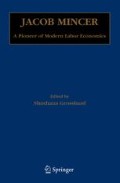Abstract
This paper evaluates the empirical performance of the standard Mincer earnings equation thirty years after the publication of Schooling, Experience and Earnings. Over this period, there has been a dramatic expansion in micro data and estimation techniques available to labor economists. How does the Mincer equation stand in light of these advances in empirical labor economics? Is it time to revise our benchmark model? On the basis of the existing literature and some new empirical estimates, I conclude that the Mincer equation remains an accurate benchmark for estimating wage determination equations provided that it is adjusted by (1) including a quartic function in potential experience instead of just a quadratic, (2) allowing for a quadratic term in years of schooling to capture the growing convexity in the relationship between schooling and wages, and (3) allowing for cohort effects to capture the dramatic growth in returns to schooling among cohorts born after 1950.
An early version of this paper was prepared for an invited lecture at the Journées de la microéconomie appliquée at Université Laval, June 8 2000. I would like to thank Bernard Fortin for inviting me to present this lecture. I would also like to thank David Card, Nicole Fortin, Shoshana Grossbard, James Heckman, and an anonymous referee for useful comments, and SSHRC, FCAR, NIHCD (1 R01 HD39921-01) and the Center for Labor Economics (UC Berkeley) for financial support
Access this chapter
Tax calculation will be finalised at checkout
Purchases are for personal use only
Preview
Unable to display preview. Download preview PDF.
References
Beaudry, Paul, and David Green. (2000). “Cohort Patterns in Earnings and the Skill-Biased Technical Change Hypothesis.” Canadian Journal of Economics 33, 907–936.
Becker, Gary S. (1975). Human capital (2nd Edition), Chicago: University of Chicago Press.
Becker, Gary S., and Barry Chiswick. (1966). “Education and the Distribution of Earnings.” American Economic Review 56, 358–369.
Card, David. (1999). “The Causal Effect of Education on Earnings.” in Orley Ashenfelter and David Card (eds), Handbook of Labor Economics, Amsterdam: North Holland, pp. 1801–1863.
Card, David, and John DiNardo. (2002). “Skill-Biased Technological Change and Rising Wage Inequality: Some Problems and Puzzles.” Journal of Labor Economics 20, 733–783
Card, David and Alan Krueger. (1992). “Does School Quality Matter? Returns to Education and the Characteristics of Public Schools in the United States.” Journal of Political Economy 100, 1–40.
Card, David, and Thomas Lemieux. (2001a). “Can Falling Supply Explain the Rising Return to College for Younger Men? A Cohort-Based Analysis.” Quarterly Journal of Economics 116, 705–746.
Card, David, and Thomas Lemieux. (2001b). “Dropout and Enrollment Trends in the Post War Period: What Went Wrong in the 1970s?” in Jonathan Gruber (ed.) An Economic Analysis of Risky Behavior Among Youth, Chicago: University of Chicago Press for NBER, pp. 439–482.
Chiswick, and Barry. (this volume). “Jacob Mincer, Experience, and the Distribution of Earnings”
Deschênes, and Olivier. (2001). “Unobserved Ability, Comparative Advantage and the Rising Return to Education in the United States: A Cohort-Based Approach.” Princeton University Industrial Relations Section Working Paper No. 465, August.
Fortin, Nicole M., and Thomas Lemieux. (1998). “Rank Regressions, Wage Distributions, and the Gender Gap.” Journal of Human Resources 33, 610–643.
Gosling, Amanda, Stephen Machin, and Costas Meghir. (2000). “The Changing Distribution of Male Wages in the U.K..” Review of Economic Studies 67, 635–66.
Heckman, James J., Anne Layne-Farrar, and Petra E. Todd. (1996). “Human Capital Pricing Equations with an Application to Estimating the Effect of Schooling Quality on Earnings.” Review of Economics and Statistics 78, 562–610.
Heckman, James J., Lance J. Lochner, and Petra E. Todd. (2003). “Fifty Years of Mincer Earnings Regressions.” National Bureau of Economic Research Working Paper No. 9732, May.
Heckman, James J., and Solomon Polachek. (1974). “Empirical Evidence on the Functional Form of the Earnings-Schooling Relationship.” Journal of the American Statistical Association 69, 350–354.
Katz, Lawrence, and Kevin Murphy. (1992) “Changes in Relative Wages, 1963–1987: Supply and Demand Factors.” Quarterly Journal of Economics 107, 35–78
Lemieux, and Thomas. (2005). “Increasing Residual Wage Inequality: Composition Effects. Noisy Data, or Rising Demand for Skill?” University of British Columbia mimeo.
MaCurdy, Thomas, and Thomas Mroz. (1991). “Estimating Macroeconomic Effects on Wages from Cohort Specifications.” Stanford University mimeo.
Miller, and Herman P. (1966). Income distribution in the United States, Bureau of the Census, U.S. Department of Commerce: Washington, D.C.
Mincer, and Jacob. (1958). “Investment in Human Capital and Personal Income Distribution.” Journal of Political Economy 66, 281–302.
Mincer, and Jacob. (1974). Schooling, Experience and Earnings, Columbia University Press: New York.
Mincer, and Jacob. (1997). “Changes in Wage Inequality, 1970–1990.” Research in Labor Economics 16, 1–18.
Murphy, Kevin M., and Finis Welch. (1990). “Empirical Age-Earnings Profiles.” Journal of Labor Economics 8, 202–229.
Polachek, and Solomon W. (this volume). “Proving Mincer Right: Mincer’s Overtaking Point and the Lifecycle Earnings Distribution”
Polachek, Solomon W., and W. Stanley Siebert. (1993). The Economics of Earnings. Cambridge, UK: Cambridge University Press.
Rosen, and Sherwin. (1992). “Distinguished Fellow: Mincering Labor Economics.” Journal of Economic Perspectives 6, 157–170.
Welch, and Finis. (1979). “Effects of Cohort Size on Earnings: The Baby Boom Babies’ Financial Bust.” Journal of Political Economy 87, S65–S98.
Willis, and Robert J. (1986). “Wage Determinants: A Survey and Reinterpretation of Human Capital Earnings Functions.” in Orley Ashenfelter and Richard Layard (eds.), Handbook of Labor Economics, Amsterdam: North-Holland, pp. 525–602.
Author information
Authors and Affiliations
Editor information
Rights and permissions
Copyright information
© 2006 Springer Science+Business Media, Inc.
About this chapter
Cite this chapter
Lemieux, T. (2006). The “Mincer Equation” Thirty Years After Schooling, Experience, and Earnings. In: Grossbard, S. (eds) Jacob Mincer A Pioneer of Modern Labor Economics. Springer, Boston, MA. https://doi.org/10.1007/0-387-29175-X_11
Download citation
DOI: https://doi.org/10.1007/0-387-29175-X_11
Publisher Name: Springer, Boston, MA
Print ISBN: 978-0-387-29174-1
Online ISBN: 978-0-387-29175-8
eBook Packages: Business and EconomicsEconomics and Finance (R0)

